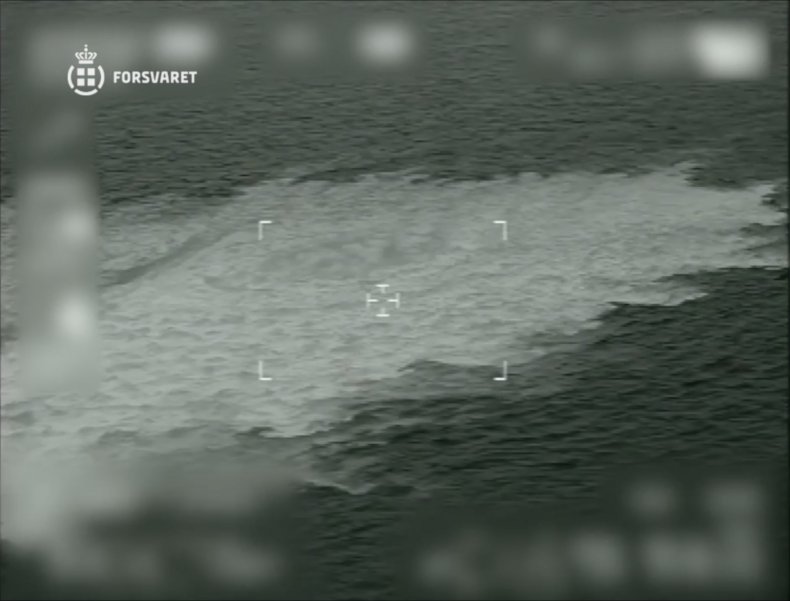TOM NORTON
Source Link
World leaders and intelligence agencies are still unpicking reports of leaks along the two Nord Stream pipelines, which supply natural gas from Russia to Europe. Some believe the actions could be an act of sabotage, potentially by Russia or by the U.S.
Drops in pressure were first detected Monday by the operators of the Nord Stream 1 and Nord Stream 2 pipelines, funded and constructed by the Russian government, which have been at the center of the geopolitical storm fueled by Russia's war in Ukraine.
While neither pipeline was in operation at the time of the incidents, they contained gas under pressure within them, and they come at a time of heightened tensions after Russia held illegitimate "referendums" on its annexation of regions in eastern Ukraine.
So what will the impacts be on the global energy supply and on the conflict in Ukraine, and to what extent do we know the facts about how the pipelines were damaged? Newsweek Fact Check looked at the evidence.
 Footage published September 27 by the Danish Defense Command shows a gas leak at the Nord Stream pipeline near the Danish island Bornholm in the Baltic Sea.HELIKOPTER WING/DANISH DEFENCE COMMAND
Footage published September 27 by the Danish Defense Command shows a gas leak at the Nord Stream pipeline near the Danish island Bornholm in the Baltic Sea.HELIKOPTER WING/DANISH DEFENCE COMMANDWhat We Do Know
As of September 28, 2022, it's been confirmed that both the Nord Stream 1 and 2 pipelines have been damaged.
The Nord Stream 1 pipeline, which exports natural gas to Germany, suffered two leaks, with another one reported in the defunct Nord Stream 2 line, a project scuppered by U.S. sanctions.
A video was released by the Danish Defence Command on Tuesday, September 27, which it says shows a gas leak from the pipelines, marked by a huge, seemingly unnatural swell of foam in the middle of the Baltic Sea.
The Danish military added that "prohibition zones" have been established around the site of the leaks.
Initially, some officials, including those in the U.S., were slow to apportion blame or speculate on the cause, even though the emergence of three leaks in two pipelines in one day seemed an unlikely coincidence.
European Union Commission President Ursula von der Leyen wrote on Twitter that the leaks were an act of "sabotage," although did not go as far as to assign blame directly.
Danish prime Minister Mette Frederiksen said she "cannot rule out" the possibility of sabotage, and that it was "difficult to imagine" that such an event could be random.
Polish Prime Minister Mateusz Morawiecki also labeled the incident "sabotage" and implied it was a deliberate heightening of Russian aggression.
"We do not know the details of what happened yet, but we can clearly see that it is an act of sabotage," he said. "An act that probably marks the next stage in the escalation of this situation in Ukraine."
White House Press Secretary Karine Jean-Pierre said during a press briefing that while she would not "speculate" on the cause, the Biden administration would "provide support" to European allies "once they have completed their investigation."
German energy minister Robert Habeck acknowledged the vulnerabilities that infrastructure like the pipelines presented. "Of course, critical infrastructure is a potential target. But we have known that not just since yesterday," he said.
"This has been the basis of the work for months. And security authorities, agencies, this ministry and also the operators, of course, are doing their part to protect themselves, to protect the infrastructure and to ensure a secure energy supply."
Responding to a comment request from Newsweek, a spokesperson for Germany's Minister of the Interior Nancy Faeser shared her statement:
""The suspected acts of sabotage on the Nord Stream pipelines must be clarified swiftly and thoroughly, despite all the challenges posed by the deep waters and the ongoing gas leaks. The Danish and Swedish authorities are conducting the investigations, and we are in close contact with them.
"Protecting our critical infrastructure has the highest priority. For months, we have been operating under the presumption of a general threat to our energy infrastructure, as this infrastructure is a particular focus of public attention. We are constantly adjusting our threat assessment to the current situation.
"In this situation, we are seeing once more how closely intertwined external and internal security are. We must prepare for scenarios that were scarcely conceivable until recently. This requires strong security authorities that are equipped with the necessary resources and powers."
Meanwhile, Ukraine has apportioned blame directly at Russia; Mykhailo Podolyak, senior adviser to President Volodymyr Zelensky, wrote on Twitter that the leaks were "a terrorist attack planned by Russia and an act of aggression towards E.U."
Russia itself has not ruled out the possibility that the leaks were an act of sabotage either, though it pushed back against accusations purporting its involvement, which the Kremlin called "stupid."
In response to a question from the state-run TASS Russian News Agency, Kremlin spokesperson Dmitry Peskov said: "Obviously, there is some kind of destruction of the pipe. And as for what caused it, before the results of the research appear, we cannot rule out any single way."
 Russian Presidential Press Secretary Dmitry Peskov seen during the military parade at Red Square, on May 9, 2021 in Moscow, Russia.MIKHAIL SVETLOV/GETTY
Russian Presidential Press Secretary Dmitry Peskov seen during the military parade at Red Square, on May 9, 2021 in Moscow, Russia.MIKHAIL SVETLOV/GETTYA NATO official told Newsweek that the alliance was "monitoring the situation in the Baltic Sea closely" adding: "Allies are looking into the gas leaks and exchanging information, also with Finland and Sweden."
Although there is a possibility that the leaks could have occurred by coincidence through poor maintenance, the chances seem rather small.
The pipelines themselves are concrete weight coated, ranging from 60 millimeters to 110 millimeters in thickness. The pipes have an average weight of 11 tons, which Nord Stream says "guarantees the stability of pipes when laid on seabed."
Furthermore, the leaks were reported a day before the inaugural opening of the Baltic pipeline, running from Norway to Poland, a project which Norwegian energy minister Terje Aasland said was "an important step on the important road to Europe's independence from Russian energy."
System operator Energinet said the project could be put into full operation one month ahead of schedule, brought forward from January 1, 2023, to the end of November 2022.
In terms of disruption to gas supplies, the "sabotage" of the Nord Stream pipelines (in effect) only impacts one pipeline, as Nord Stream 2, while commissioned, is not in operation.
The Nord Stream 1 pipeline has also been shut down for weeks, and so has not been a steady supplier of natural gas to Europe for some time. The Russian state-owned company Gazprom shut it down earlier in September, with Russia saying it would not restart the line until Western sanctions against Russia were lifted.
Gazprom cited the need for maintenance work and "malfunctions" in their initial decision to shut down the pipeline, fomenting an energy crisis for much of Europe.
Before Russia halted Nord Stream 1 operations, the Kremlin, seeing economic struggles amid the war, sought to convince Europe to start up Nord Stream 2, but Western sanctions have remained in place.
While Russia remains the largest exporter of not only natural gas but crude oil and solid fossil fuels to Europe, it is by no means the only supplier either—and its share has been dropping as the E.U. sought to diversify away from an unreliable supplier.
Around 34 percent of natural gas is still delivered into the continent from Russia, according to EU data for the first quarter of 2022. While it has dropped over the past few years, it is still higher than other exporters including Norway (22 percent), Algeria (10.6 percent) and others.
Earlier this month, U.S. Secretary of State Antony Blinken cited Russia's decision to cut off supplies through Nord Stream 1 as "further evidence that it is so vital strategically for Europe to move away from dependence on Russian energy because [Russian President Vladimir] Putin has shown repeatedly that he will use it as a weapon."
Commenting on the pipeline leaks, Blinken said "the leaks are under investigation" and that "there are initial reports indicating that this may be the result of an attack or some kind of sabotage."
"If it is confirmed," he added, "that is clearly in no one's interest."
What We Don't Know
European leaders have speculated that the disruption was caused by acts of sabotage or "deliberate action," which the Kremlin has not ruled out.
However, the exact motive at such an early stage is still hard to decipher. Some have questioned the logic of Russia damaging its own gas supply lines to the West given that, despite tensions, there would be little advantage to disrupting a great source of its revenues (on top of laying waste to a multibillion-dollar investment).
With Nord Stream 1 already shut, an additional physical attack on the infrastructure would appear to be overkill, and thus somewhat puzzling (although the destruction may be more symbolic, with some observers speculating, without evidence, that it amounts to a threat against other European undersea pipelines and cables).
Since then Gazprom, the Russian state-owned gas giant, has threatened to cut off the remaining supplies, including the pipeline stretching through Ukraine, fueling speculation about energy blackmail. There is, however, no concrete evidence to link these two developments.
Gazprom has just released a statement that basically says it will stop sending gas to Europe through Ukraine.
It’s naturally connected to the Nord Stream explosions and it’s an attempt to either drive prices up much more ahead of winter or an indication that deliveries will stop https://t.co/F6K9eZfFkp— Visegrád 24 (@visegrad24) September 28, 2022
How the pipelines got damaged is also still unclear. Björn Lund of the Swedish National Seismic Network at Uppsala University told national broadcaster SVT that readings near the sites of the leak indicated a blast occurred around the time of the leaks.
Some media reports have speculated that mines could have been laid to be detonated later, potentially by deep sea divers.
Nord Stream, the company that operates the pipelines, said on its company website that the "causes are being investigated," but offered no further details.
While there is also no doubt that the conflict in Ukraine has raised the wholesale price of energy, impacting the cost of living for U.S. citizens, how much the Nord Stream pipeline leaks will hit the U.S. (and global energy markets) remains to be seen.
Over the past five days, the price of Russian-sourced Urals crude has nearly doubled to 109 U.S. dollars per barrel, but prices of other types of oil remained relatively stable.
At present, the most significant threat to U.S./Russian relations appears to be one of diplomacy. The leaks follow recent threats by Russia to use nuclear weapons in the event that the annexed regions of Ukraine are invaded.
It could be that talk of retaliatory action should Russia use nuclear weapons—with the U.S. stating it would enact "catastrophic consequences" if Putin did use a nuke—could have soured Moscow's relationship with the West even further.
Jake Sullivan, Biden's national security adviser, appearing on ABC News' This Week, said the U.S. was taking the threats "seriously," adding it was not "the first time President Putin has made a nuclear threat in this conflict."
"And we have communicated directly, privately to the Russians at very high levels that there will be catastrophic consequences for Russia if they use nuclear weapons in Ukraine," Sullivan added.
"We have been clear with them and emphatic with them that the United States will respond decisively alongside our allies and partners," he continued, adding that the Russians "well understand what they would face if they went down that dark road."
No comments:
Post a Comment